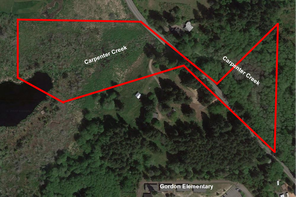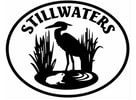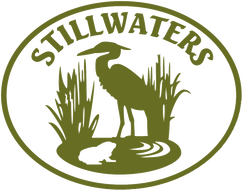Stillwaters Announces Conservation - Carpenter Creek

Stillwaters Environmental Center, Kingston, WA, has announced the conservation of almost 1,100 feet of Carpenter Creek and the last section of Carpenter Lake that is not yet in Carpenter Lake Park near Kingston.
“With this project closing, Stillwaters Environmental Center achieved a goal to partner with the Beebes to protect and restore Carpenter Creek as it feeds our estuary, and as the Kingston Urban Growth area develops,” said Program Director Melissa Fleming. “The restoration plan was made possible by the combined efforts of the Kitsap Conservation District, Kitsap County, wetland biologist Joanne Bartlett and the support of Stillwaters members.”
Donation
The donation of conservation easements by area residents, Keith and Michelle Beebe, puts approximately eight acres into protection, monitoring, and restoration efforts. Financial support will eventually reach $60,000 and supports stewardship of the property as well as a broader effort to encourage other landowners along Carpenter Creek to make habitat improvements. A wetland restoration study supported by a grant from the Kitsap Conservation District and an update provided by Kingston resident Joanne Bartlett at Environmental Land Services, form the basis for the restoration effort.
Trail
A portion of the property includes a crucial bridge and boardwalk over Carpenter Creek granted as an eventual public access easement if efforts to connect trails to downtown Kingston are successful. The trail would access Barber Cutoff Road where the school district and local trail group have planned an access to both Gordon Elementary and Carpenter Lake Park. “There is much to sort out, but preserving access across the creek is vital so our kids and neighbors can get to the school and park without walking along Barber Cutoff Road,” said Keith Beebe.
Restoration
Efforts by local volunteers and the active support of Kitsap Conservation District over the last 18 months have led to the removal of a vast quantity of Himalaya blackberry and Scotch broom. Supporting beaver activity and fighting invasive plants like reed canary grass and yellow flag iris will be a big part of initiating a plan designed by wetland experts. “I suspect that grant money for a major restoration may be a long way off in these times, but there are many things Kingston can do to get the restoration started, and social distancing with blackberries isn’t a problem,” said Keith Beebe.
“The property is a key piece of the Carpenter Creek watershed and this action by Stillwaters works to help protect the creek habitat and move forward on trail and education opportunities for the future. There is much work to be done, and community involvement is encouraged,” said Melissa Fleming.
Other property owners bordering Carpenter Creek are asked to contact Stillwaters, the Conservation District, or the Beebes for more information on how to join this effort.
For more information, call or email
Keith Beebe: 360-337-0125 or kbeebe9791@g,mail.com
Melissa Fleming: 360-297-1226 or [email protected]
Carin Anderson, Kitsap Conservation District: 360-204-5529 [email protected]
“With this project closing, Stillwaters Environmental Center achieved a goal to partner with the Beebes to protect and restore Carpenter Creek as it feeds our estuary, and as the Kingston Urban Growth area develops,” said Program Director Melissa Fleming. “The restoration plan was made possible by the combined efforts of the Kitsap Conservation District, Kitsap County, wetland biologist Joanne Bartlett and the support of Stillwaters members.”
Donation
The donation of conservation easements by area residents, Keith and Michelle Beebe, puts approximately eight acres into protection, monitoring, and restoration efforts. Financial support will eventually reach $60,000 and supports stewardship of the property as well as a broader effort to encourage other landowners along Carpenter Creek to make habitat improvements. A wetland restoration study supported by a grant from the Kitsap Conservation District and an update provided by Kingston resident Joanne Bartlett at Environmental Land Services, form the basis for the restoration effort.
Trail
A portion of the property includes a crucial bridge and boardwalk over Carpenter Creek granted as an eventual public access easement if efforts to connect trails to downtown Kingston are successful. The trail would access Barber Cutoff Road where the school district and local trail group have planned an access to both Gordon Elementary and Carpenter Lake Park. “There is much to sort out, but preserving access across the creek is vital so our kids and neighbors can get to the school and park without walking along Barber Cutoff Road,” said Keith Beebe.
Restoration
Efforts by local volunteers and the active support of Kitsap Conservation District over the last 18 months have led to the removal of a vast quantity of Himalaya blackberry and Scotch broom. Supporting beaver activity and fighting invasive plants like reed canary grass and yellow flag iris will be a big part of initiating a plan designed by wetland experts. “I suspect that grant money for a major restoration may be a long way off in these times, but there are many things Kingston can do to get the restoration started, and social distancing with blackberries isn’t a problem,” said Keith Beebe.
“The property is a key piece of the Carpenter Creek watershed and this action by Stillwaters works to help protect the creek habitat and move forward on trail and education opportunities for the future. There is much work to be done, and community involvement is encouraged,” said Melissa Fleming.
Other property owners bordering Carpenter Creek are asked to contact Stillwaters, the Conservation District, or the Beebes for more information on how to join this effort.
For more information, call or email
Keith Beebe: 360-337-0125 or kbeebe9791@g,mail.com
Melissa Fleming: 360-297-1226 or [email protected]
Carin Anderson, Kitsap Conservation District: 360-204-5529 [email protected]

